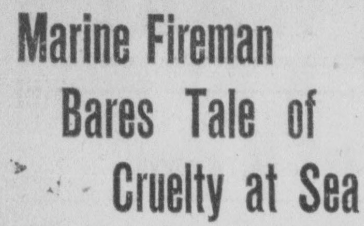
In the annals of labor history, we encounter a multitude of stories that bring to light the dark underbelly of industrialization and capitalism. This 1927 news article is a shocking tale of brutality and abuse at sea that bears an urgent and timeless call to action. It paints a vivid picture of the harsh realities that many seamen faced, underscoring the urgency of creating a strong labor union to safeguard their rights and interests.
Marine Fireman Bares Tale of Cruelty at Sea

May 16, 1927 – John Hansen, a fireman on the S.S. Steelmaker of the Isthmian Line, which plies between this port and Yokohama and other oriental ports, was badly beaten at the hands of the first engineer, E. Erwin, a typical bully of the company slave driver type.
The incident took place on the second engineer’s watch while Hansen was down in the fire pit cleaning oil burners. He had just cleaned out nine burners and was about to begin on the stokehole floor, which was covered with pain and kerosene, when the second engineer approached him and asked him whether he had cleaned out the bilges. Hansen answered him that as soon as he would be thru on the stokehole floor he would begin on the bilges. He then went away and Hansen returned to the nauseating job of working in paint and kerosene on the steel floor.
After a little time had passed and Hansen was still on the floor, the bullying first engineer came into the stoke compartment and after cynically surveying Hansen’s labor he approached him and asked him the same question that the second engineer had asked him a short time before. He answered him in the same manner that he had answered the second engineer.
Beaten Badly
The first engineer thereupon insulted him and lashed out at him with his fists, knocking him about the face and body. Hansen was badly beaten. When he asked to be taken to the captain, the first engineer emphatically refused to do this, saying that there was no reason to do so.
When Hansen made a broken attempt to climb up that ladder the first engineer knocked him down the iron rungs injuring him still further. He continued his brutalities, knocking out one of Hansen’s teeth and otherwise injuring him. He also threatened to murder him if he reported it and didn’t go back to the stokehole.
Consequently Hansen was forced to drag his beaten body back into the stokehole and forced to finish his watch despite the terrible beating which he had received. A Spanish oiler by the name of June was witness to the proceedings but was helpless to interfere.
Finally Hansen was able to see the captain. This availed him little so far as satisfaction for his injuries was concerned. The captain told him to wait till they arrived in Philadelphia and then to see the shipping commissioner.
The shipping commissioner sent him to the seamen’s doctor at the port barge office. Here he received al letter to pay him off at New York as he no longer wanted to sail on the S.S. Steelmaker.
Forced to Stay on Boat
The captain, however, tried to force him to remain on the boat until they reached Providence despite him weakened condition after the beating.
When he got back to New York he was told that he would be paid off Friday. He received but five dollars from the shipping commissioner for maintenance till the ship returns.
These conditions of brutality and mistreatment of sailors and firemen are not unusual or out of the way and will continue to be so until the men are organized into a strong body, able to fight and gain their economic and social demands. If all the seamen were organized in one strong union able to fight for and protect the rights of the men while on the job, such conditions would be a nightmare of the distant past.
As it is, they still occur, not always as in the case of Hansen to the extent of a brutal display of physical force on the part of the company officials, but in the removal of the basic rights of the marine workers, to the mercenary advantage of the companies employing them.
The obvious solution is in organization. The class consciousness of the seafarer must be raised to the stage where he will naturally respond to the stimulus of organization into a strong union.
The daily worker. (Chicago, Ill.), 16 May 1927.

